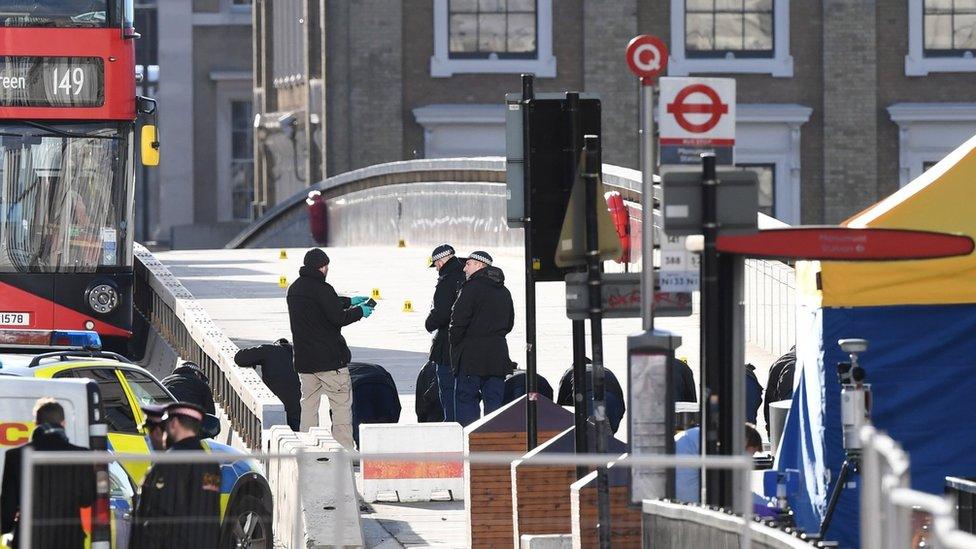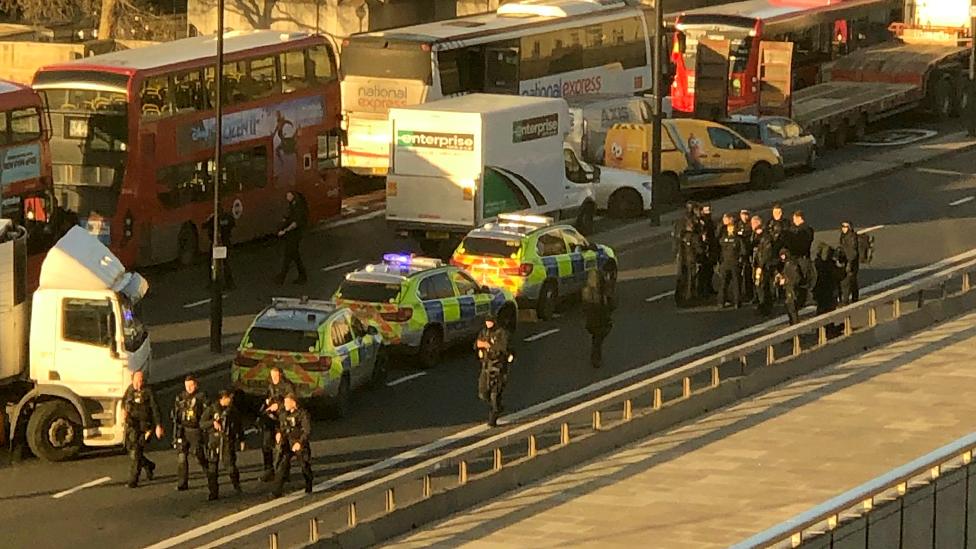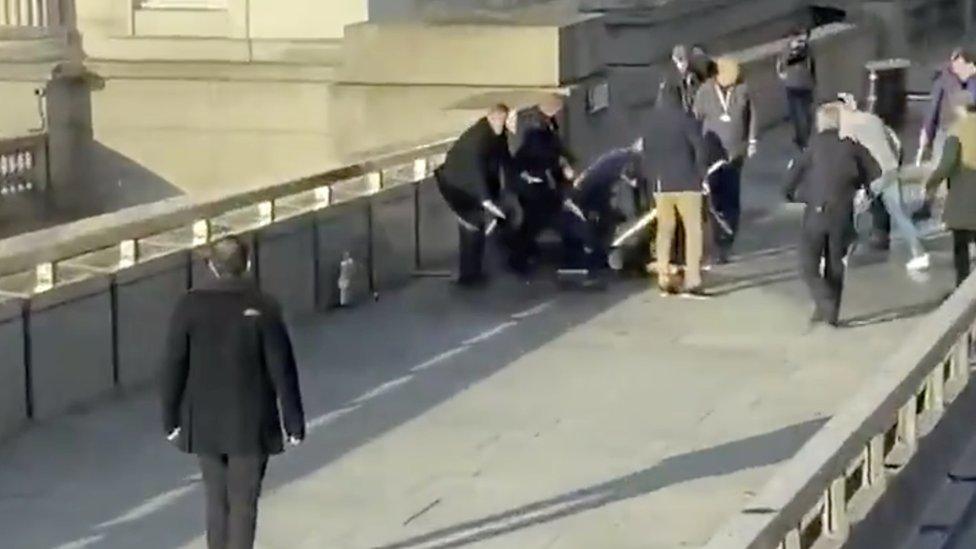London Bridge attack: Sentencing row - who did what?
- Published

Usman Khan's murderous rampage has thrown the spotlight on the way in which he was sentenced and how his sentence was reviewed and changed by the Court of Appeal.
It has also led to claims and counter claims by Labour and the Conservatives over who was to blame for a sentencing regime which allowed Khan's automatic release with its tragic consequences.
Sentencing is massively complex, even for lawyers and judges. So, let's try and pick a way through the thicket of sentencing laws involved in this case and understand what happened.
What was his original sentence?
Usman Khan pleaded guilty and was convicted in January 2012 of engaging in conduct in preparation for acts of terrorism.
Although the offence carries a maximum sentence of life imprisonment, he was given a sentence of detention for public protection (DPP) with a minimum term in custody of eight years.
What is a DPP?
It is a version of the sentence of Imprisonment for Public Protection (IPP). IPPs were a highly controversial new kind of sentence introduced by Labour in England and Wales, under the Criminal Justice Act of 2003.
They were designed for serious offenders who posed a significant risk of harm to the public, but who did not merit a life sentence. DPPs were only given to those aged between 18-21.
The offender had to serve a minimum term, following which they had to satisfy the Parole Board that they no longer posed a risk to the public.

Usman Khan pleaded guilty and was convicted in January 2012 of terror charges
They were controversial because many IPPs were given to lower level criminals (street robbers and one to a man who set fire to a wheelie bin).
They were often given short minimum terms and it was extremely difficult for offenders with borderline personality disorders to prove they did not pose a risk.
The numbers on IPPs rapidly grew into the thousands under Labour - many regarded them as "life sentences by default".
Under the DPP given to Khan the Parole Board would have played a key role in his release.
If it had considered he posed a risk at the end of his minimum term of eight years he would not have been released and would not have been able to carry out his murderous attack.
London Bridge attacker "wanted to deradicalise" at time of conviction - lawyer
IPPs and DPPs were scrapped by the Conservatives in 2012, by which time the number of prisoners serving them had risen to over 6,000.
It followed a ruling by the European Court of Human Rights that the sentences were unlawful because the lack of rehabilitation courses meant offenders could not reduce or eliminate the risk they posed to the public.
Why did the Court of Appeal change the sentence?
Khan appealed his sentence to the Court of Appeal. In 2013, it was quashed and substituted with what is known as an extended sentence
Khan was a member of a group in Stoke who had liaised with a group in London planning to bomb the London Stock Exchange.
The original sentencing judge Mr Justice Wilkie considered that although the criminality of both groups was equally serious, the Stoke group were more sophisticated and so more dangerous.
The Court of Appeal disagreed, finding that if the plans of the groups were equally serious the risk posed by the Stoke group could not be greater than the London group who were far more advanced in their plans.
So, Khan and the Stoke group were given extended sentences - the same as those given to the London group.
What is an extended sentence?
Basically it is a sentence given to an offender who is deemed to be "dangerous" and for whom a "determinate" sentence is not thought to be sufficient to manage the risk he poses to the public.
The offender is given a prison term - 16 years in Khan's case - plus an extended period on licence of five years. This can be eight years for an offender sentenced for serious sexual offences.
Why was he automatically released after eight years?
Here is where there is real confusion. In 2008 Labour introduced changes that affected extended sentences.
Boris Johnson says about 74 convicted terrorists have been released early from prison
Offenders serving them were no longer reviewed by the Parole Board - instead they were released automatically halfway through their sentence.
The change was in part to deal with the problem of a prison population that had swelled due to the numbers of dangerous prisoners who had been given IPPs and could not be released because they could not prove they no longer posed a risk to the public.
However, extended sentences were changed again by the Conservative-led coalition government in December 2012.
From that date offenders like Khan serving a custodial period of more than 10 years would serve two thirds of their sentence and then be considered for release by the Parole Board. This was not applied retrospectively though so did not apply to Khan.
So, in effect, he was the beneficiary of a period between 2008 and December 2012 where prisoners on extended sentences were freed automatically at the half-way point in their sentence. Before and after that period they were subject to Parole Board assessment before release.
Confusion in the Court of Appeal?
In his judgment Lord Justice Leveson said: "Given that it is difficult to identify the extent to which those who have been radicalised (perhaps as a result of immaturity or otherwise) will have modified their views having served a substantial term of imprisonment and there is an argument for concluding that anyone convicted of such an offence should be incentivised to demonstrate that he can safely be released; such a decision is then better left to the parole board for consideration proximate in time to the date when release becomes possible."
That has caused some to question whether the court had in mind an extended sentence for Khan subject to Parole Board risk assessment when no such assessment was in fact possible.
Other commentators such as the Secret Barrister do not see confusion or error in the Court of Appeal's decision.
He writes that Lord Justice Leveson was "simply weighing up the competing arguments before concluding that an (extended sentence) even though it meant automatic release, was appropriate".
If the court had dismissed Khan's appeal and kept his DPP sentence in place, his release would have been subject to assessment by the Parole Board.
If it had considered him a risk, he would have remained in prison and unable to carry out his plan to murder.
Judges never explain or unpick their judgements so we will not hear from the Court of Appeal on this.
The current law however means that no-one sentenced to a terrorism offence is now subject to automatic early release.
- Published1 December 2019

- Published30 November 2019
